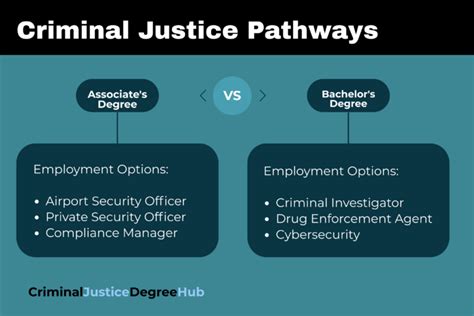A Bachelor of Science in Criminal Justice prepares graduates for a wide range of careers in law enforcement, corrections, and the criminal justice system. With a strong foundation in criminology, criminal law, and criminal procedure, graduates are equipped to work in a variety of settings, including:

- Law enforcement: Police officers, detectives, and special agents investigate crimes, apprehend suspects, and enforce the law.
- Corrections: Probation and parole officers supervise offenders, provide counseling, and help them reintegrate into society.
- Criminal justice administration: Administrators manage criminal justice agencies, develop policies, and oversee operations.
Table 1: Common Career Paths for Criminal Justice Graduates
| Career Path | Median Annual Salary | Employment Outlook |
|---|---|---|
| Police Officer | $67,290 | 7% growth |
| Detective | $87,370 | 10% growth |
| Probation Officer | $58,830 | 9% growth |
| Parole Officer | $62,920 | 10% growth |
| Criminal Justice Administrator | $94,840 | 7% growth |
Emerging Applications for Criminal Justice Graduates
As technology advances and society evolves, new applications for criminal justice graduates are emerging. For example, graduates with a strong understanding of data analytics can work as:
- Crime analysts: Analyze crime data to identify trends, develop crime prevention strategies, and support law enforcement investigations.
- Forensic accountants: Investigate financial crimes, such as fraud and embezzlement.
- Cybersecurity analysts: Protect computer systems and data from cyber attacks.
Table 2: Emerging Applications for Criminal Justice Graduates
| Emerging Application | Required Skills | Median Annual Salary | Employment Outlook |
|---|---|---|---|
| Crime Analyst | Data analytics, criminology | $86,380 | 15% growth |
| Forensic Accountant | Accounting, criminology | $99,800 | 11% growth |
| Cybersecurity Analyst | Computer science, criminology | $120,900 | 33% growth |
Tips for Success in Criminal Justice
To succeed in a career in criminal justice, graduates should:
- Develop strong communication and interpersonal skills.
- Stay up-to-date on the latest laws and criminal justice practices.
- Be physically fit and able to work in stressful and potentially dangerous environments.
- Have a strong sense of ethics and integrity.
Tricks of the Trade
- Network with professionals in the field to learn about job opportunities and gain valuable insights.
- Volunteer or intern at a criminal justice agency to gain practical experience.
- Join professional organizations to stay informed about industry trends and connect with other professionals.
FAQs
- What is the job outlook for criminal justice graduates? The job outlook for criminal justice graduates is generally positive, with projected growth in most fields.
- What is the average salary for a criminal justice major? The average salary for a criminal justice major varies depending on the career path and location. However, the median annual salary for all criminal justice workers is $61,960.
- What are the best career options for criminal justice graduates? The best career options for criminal justice graduates include police officer, detective, probation officer, parole officer, and criminal justice administrator.
- What are the biggest challenges facing criminal justice graduates? The biggest challenges facing criminal justice graduates include the competitive job market, long hours, and potentially dangerous working conditions.
- What are the best ways to prepare for a career in criminal justice? The best ways to prepare for a career in criminal justice include getting a good education, staying up-to-date on the latest laws and practices, and developing strong communication and interpersonal skills.
- What are some emerging applications for criminal justice graduates? Emerging applications for criminal justice graduates include crime analyst, forensic accountant, and cybersecurity analyst.
Conclusion
A Bachelor of Science in Criminal Justice opens doors to a wide range of rewarding careers in law enforcement, corrections, and the criminal justice system. By developing strong skills and staying up-to-date on the latest trends, graduates can succeed in this challenging and dynamic field.
